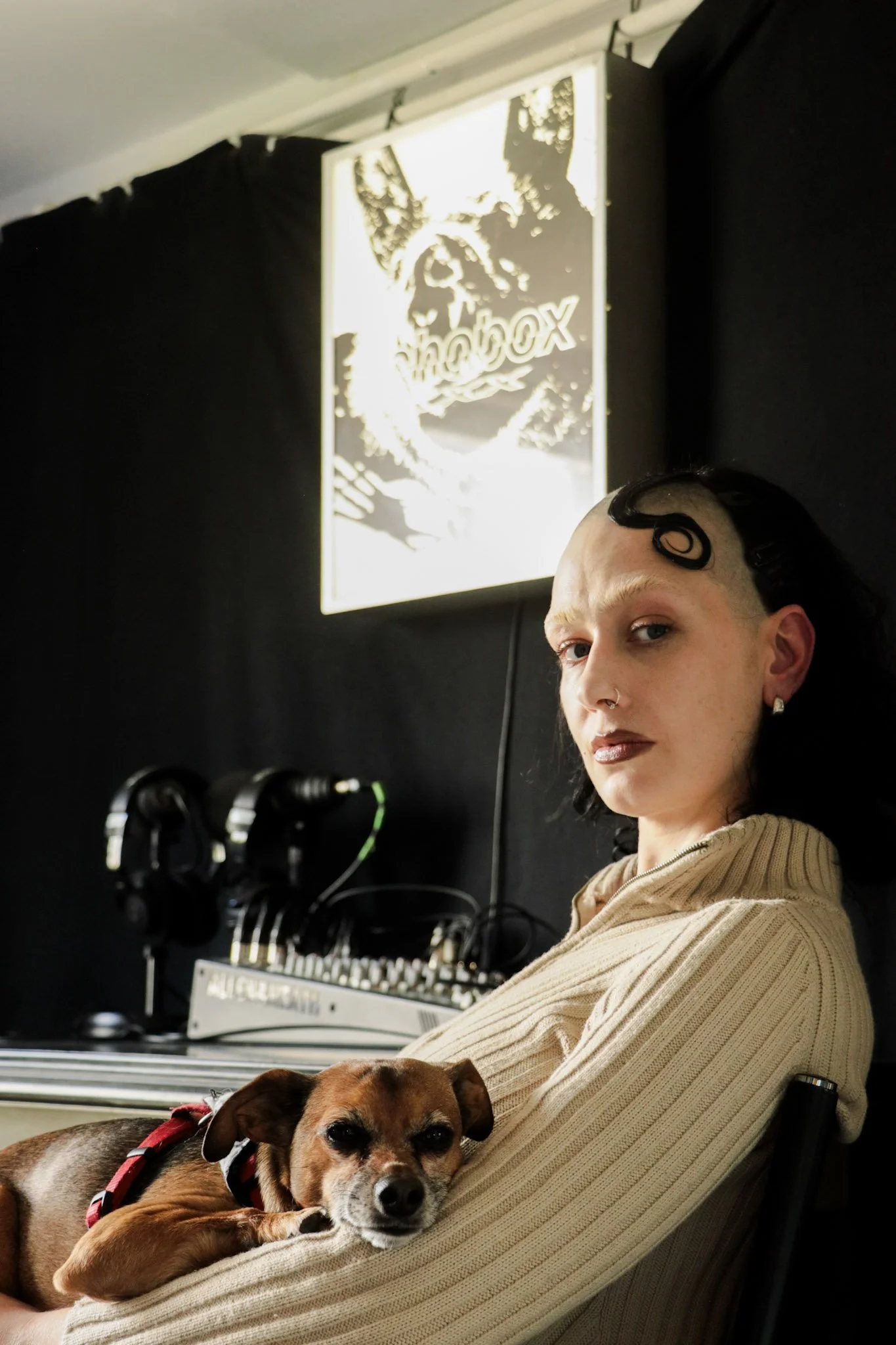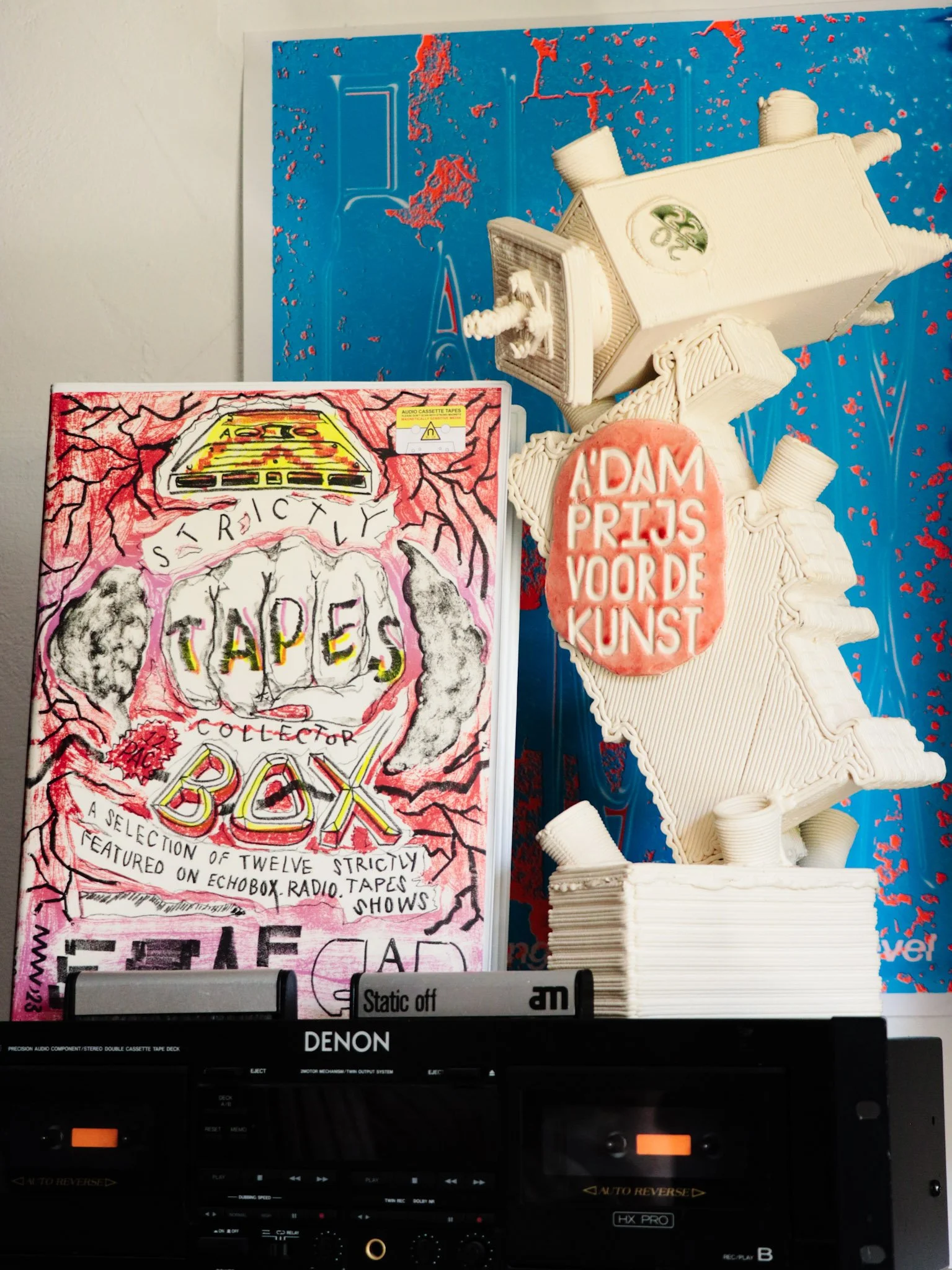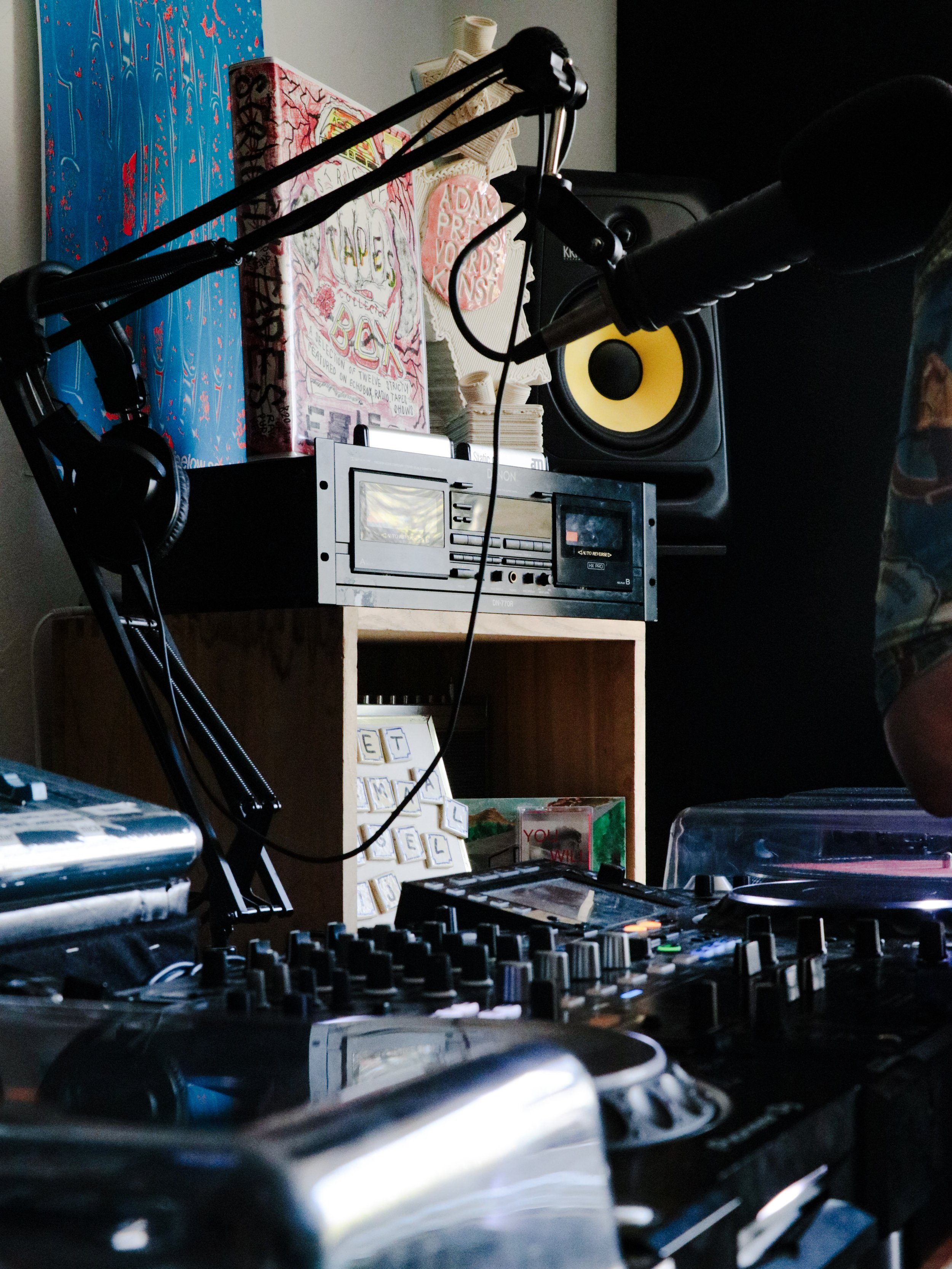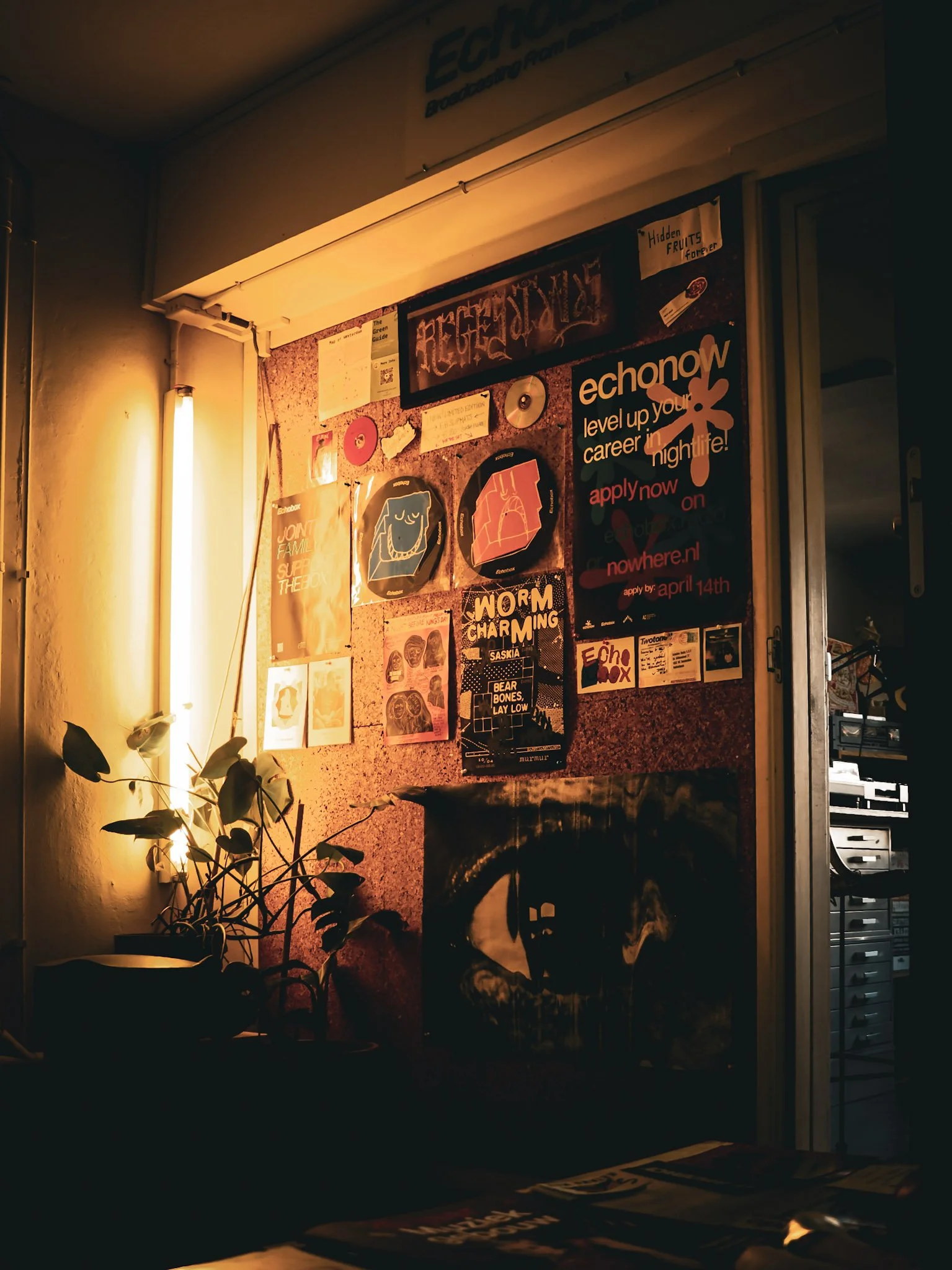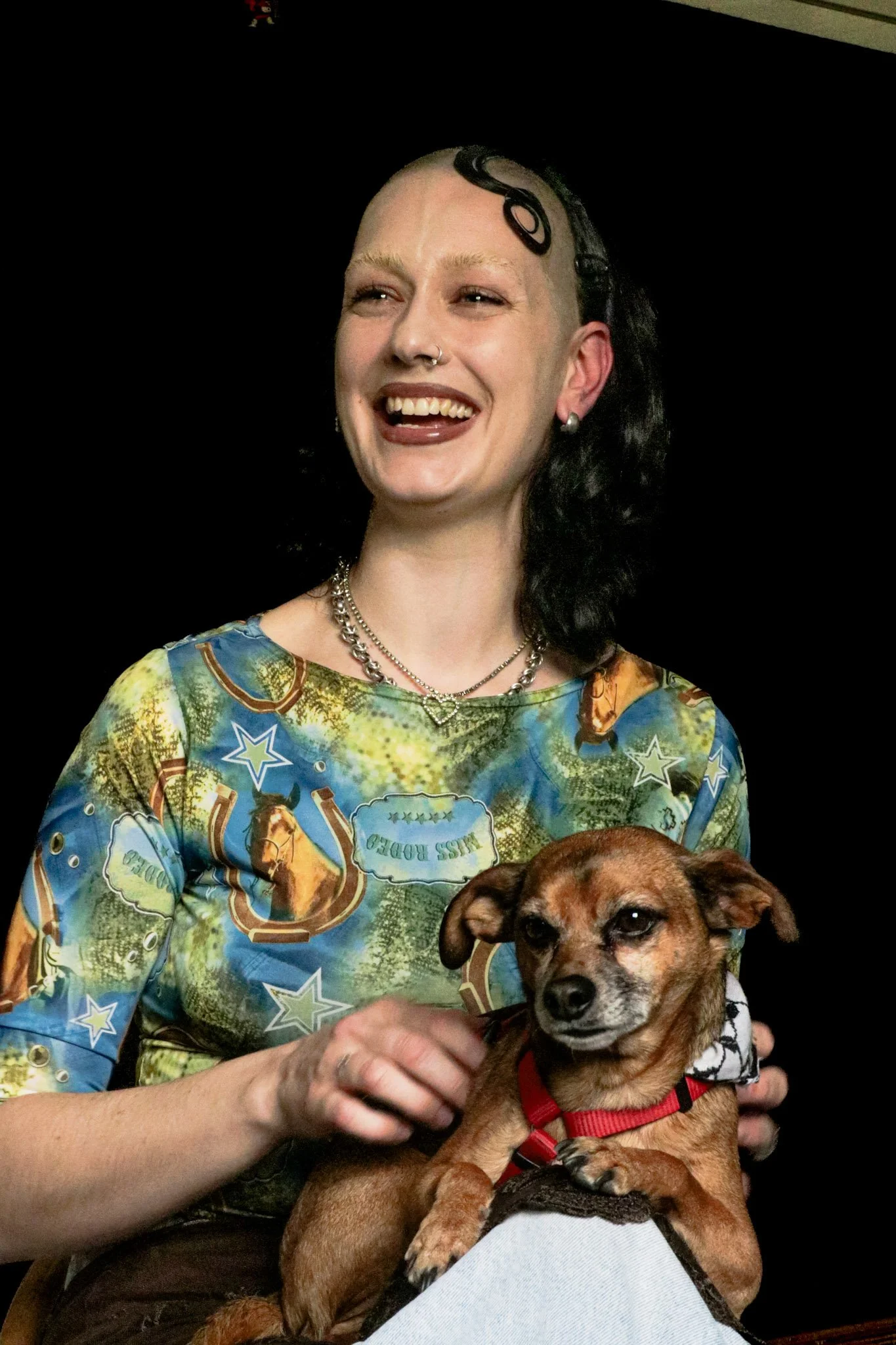Exploring Narratives of Passion and Identity with Chalice Cox-Hynd
Interview by Mariana Ferro
Photography by Jaer Vogelland
Chalice & Dino at the Echobox Radio studio
From a young age, we’re asked, ‘What do you want to be when you grow up?’ — assuming a fixed, final answer, with little room for nuance. Yet it’s hardly deserving of a surface-level response, as passions and identity evolve, with career paths often deviating from one self-evident direction. Moving away from this traditional question, we invite you to embrace the journey of becoming as we sit down with Chalice Cox-Hynd, co-founder and co-programmer of Amsterdam's independent radio station, Echobox, to explore the motivations, experiences, and values shaping their work. As a passionate music head and radio enthusiast, Chalice shares how online stations became their radio home — spaces where connection, expression, and representation matter and continue to reflect the city’s many talents and passions.
Chalice & Dino
Chalice, can you tell us about your background and what first drew you to radio?
I’m originally from the UK and moved to Amsterdam almost six years ago. I'm a co-founder and (current) co-programmer for Echobox Radio. I’ve worked many different jobs, but kept returning to radio and communications. I first fell in love with radio at the age of 19 through a student radio show. It was during the era of LimeWire, MySpace, and MP3s — marked by a shift in how we consumed music. As a 90s kid experiencing Nirvana and all of these bands, I was always nostalgic for eras I wasn't part of, and radio bridged my connection to a world I longed to be part of. I listened to as much music and read as many music magazines as I could. Growing up alternative and queer in my small conservative hometown, about 40 minutes from London, my friends and I were constantly looking for ways to connect beyond it. Eventually, it became clear that radio is where my heart lies. Now, at 34, I see how unexpected this journey has been.
How does radio act as a bridge for connection and community? And how do you see today's online radio stations carrying the legacy of pirate radio?
‘Radio’ is an ever-expanding term, shaped by modern podcast culture and the ability to revisit content — and that's a beautiful thing! But with today's overwhelming amount of choice, people crave connection and gravitate toward more human-curated experiences, which radio still offers. While working at established radio stations like the BBC and an independent radio PR firm gave me valuable experience, I really found my radio home in independent online stations — grounded, yet still holding that punk and pirate spirit.
Looking back at the history of pirate radio stations in the 60s, it's fascinating that Belgium, the Netherlands, and the UK remain huge radio hubs today. The term 'pirate radio station' derives from bootlegging or hijacking radio waves against regulations. Often, radio stations existed on maritime ships or out at sea because it was the only way they could broadcast freely. Some of the most listened to pirate radio stations on ships at the time were Radio Caroline (UK), Radio Antwerpen (BE), and Radio Veronica (NL), now a commercial media company. Today, with online stations like Kiosk Radio in Brussels, NTS Radio and Rinse FM in London, along with Amsterdam’s vibrant radio scene, you can see the pirate radio spirit coming full circle.
Chalice at the Echobox Radio studio
Can you tell us more about your journey in Amsterdam's radio scene?
When I moved here, Red Light Radio (RLR) — an Amsterdam-based online streaming platform — was still operating from an old Red Light window by Oudekerksplein. I quickly knocked on the door, asking to get involved. Eventually, this led to the start of my community — and, little did I know, the pathway to Echobox. Heartbreakingly, RLR closed during the pandemic without a proper farewell for its 10-year mark, fading away my connection to the city and radio. But as I reflected on my years of radio experience, I felt ready to pour my heart into something new. I then reconnected with Lorenzo — one of the RLR’s studio managers — to start a new radio project together with Vic Crezee, Mohamed Ghabri (also known as Mo Manager), and Rachella Groen, we started Echobox. Now, with over 150 residents collaborating and connecting, I'm witnessing a beautiful web of worlds being built again, reflecting Amsterdam’s variety of talents and passions.
With Echobox exploring new ways to engage with its audience, how do you balance professionalising while remaining an independent and community station?
Amsterdam Prijs voor de Kunst 2022
We've always been completely transparent about wanting to build a sustainable business model that will eventually enable us to pay our team and residents, which is rare in online community spaces. From the beginning, we established what kind of radio we wanted to be: one we’d listen to, free from commercial ads and representative of Amsterdam’s dynamic creativity. Though not sustainable in the long run, it was also essential to start with a completely sociocratic approach to programming; all five co-founders spent countless hours over Zoom (during lockdown), reading, reviewing, and discussing over 300 pitches. Today, most of our core team hosts their own show after having pitched and given each other feedback — there's no nepotism at Echobox, haha.
Currently, our core team balances side hustles while working at Echobox, mostly twice a week — putting in blood, sweat, tears, and passion. We're a small team of 11 core members with 150+ residents, and we’re gradually working towards a more financially sustainable reality. We monetise with events, merch, collaborations, and our family membership — a small but vital part of it, with 40% of the revenue going directly to our residents. Being a family member comes with a few perks, including exclusive Echobox news & events, merch discounts, and the chance to have mixes played on our broadcast. But mostly, it’s about being part of a community, and it’s so humbling seeing people contribute to that. We’re truly grateful to everyone who’s signed up to support us.
As head of programming, how do you approach curating for such a diverse platform in a way that still reflects your personal taste?
My current role as head of programming is quite recent — about a year now. Although I've always been involved in programming, my initial focus was more on broadcasting. Now, my responsibilities are a bit wider, although the title can be misleading. Programming takes everyone’s input — from our core team to our studio manager interns — we’re all music lovers, plugged into the scene in different ways. We're constantly checking in with each other through weekly broadcasting meetings, logging feedback. I also work really closely with my co-programmer Linder Purperhart, and we complement each other’s music tastes. It's important to me to have that sounding board, especially because shows fluctuate.
It's easy to fall into the trap of programming what you think people want, and that’s also part of it. But with independent stations like Echobox, there’s more room for freedom and authenticity. We welcome mainstream sounds, but they must be contextualised to include all sorts of different and alternative genres. The key is staying true to what you like and keeping notes — my chaotic Notes system works for me, haha. I also use loads of resources, such as listening to mixes on SoundCloud, unreleased promos, reading articles, tuning into other stations, including NTS, Kiosk, Noods, Operator, The Lot Radio… I always encourage people to trust other people's curations, consume, and expose themselves to stuff — be there if you can, say yes, and go! Worst case, you hate it, and it confirms what you do like.
As an advocate within the LGBTQ+ community, how do you see independent radios serving as platforms for self-expression?
To use all the buzzwords, I think we live in an extremely cis, het, white, patriarchal society. Exploring your identity outside the default often requires doing your research while facing limited access to representation, appropriate language, dialogue, and debate. Despite a fairly supportive upbringing, I began understanding my queer identity in my mid-twenties — and it wasn't until moving to Amsterdam in my thirties that I had another realisation about my gender identity.
Quite frequently, my own identity is negated, washed away, or unseen, particularly if I don't introduce myself with my pronouns. And while it’s difficult to navigate, I’m still very privileged. I'll forever be on the path of (un)learning, self-education, and deconstructing my privilege: being white, straight- and cis-passing, and even being a native English speaker in a world and industry that often defaults to that. I'm not trying to save anyone or speak for others who might not want my voice ahead of theirs. But if I can use my platform to empower those who exist outside of the default, then I will.
And practically speaking, how does Echobox navigate equity and representation in its programming?
At Echobox, we take equity and representation in programming very seriously, though we don't claim to get it right 100%. It starts with recognising your positionality in conversations, worldview limitations, and getting comfortable with discomfort. It's about listening rather than taking up space, and being comfortable with hearing ‘no’: it’s not a marginalised person’s responsibility to educate those who are less marginalised. In parallel, Amsterdam's diverse and vibrant city has to be reflected in our programming, all while our team stays representative of the community we aim to reach. Addressing the imbalance of opportunities across marginalised and non-marginalised people requires an ongoing process of learning. Translating that into equitable programming isn’t easy, but we're trying — it's the least you can do.
What’s the long-term vision for Echobox?
We’re working towards growing and eventually 24/7 broadcasting. With the amount of talent and creativity concentrated in Amsterdam, we believe there might be room for Echobox on a global radio scale at some point. To represent Amsterdam to the rest of the Netherlands and beyond! But we're starting humbly and small to make sure we're getting it right here in Amsterdam first — the rest will come later.
And what's next for you, both personally and professionally?
Honestly, I love where I'm at and see myself continuing as long as it makes sense for the station and me. Amsterdam's my home, and Echobox my (shared) baby — one I want to stay close to. Outside Echobox, I also DJ as Chalice Is a Witch and have had the honour to spin for TNP, Mutant Radio and play at MurMur and Garage Noord — though I see DJing more as an added pursuit. Hosting radio remains my first love and biggest source of happiness. I hosted my first show 'Chalice In Wonderland' solo — playing one hour of eclectic sounds, from metal, punk, and blues to 90s pop. Now, I co-host a weekly breakfast show 'When Do You Sprout?’ with the amazing Harry Reddick (aka K Cidder) — every Thursday morning from 9-11. I’d love to keep hosting a breakfast radio show in the years ahead.



